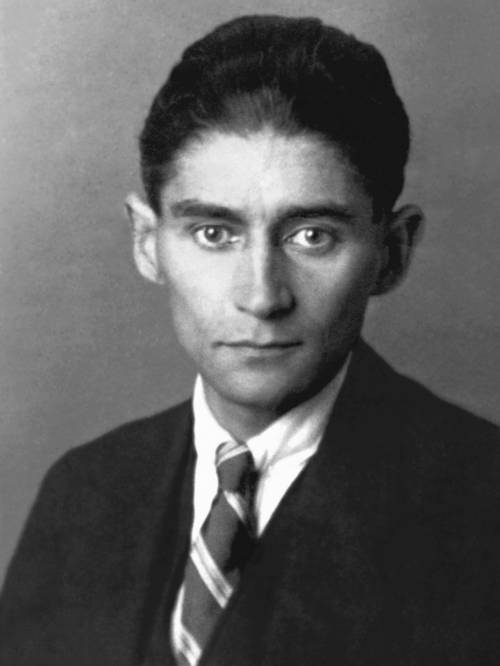
FAQ About Franz Kafka

Who was Franz Kafka?
Franz Kafka was a German-speaking Bohemian writer born on July 3, 1883, in Prague, which was then part of the Austro-Hungarian Empire. He is renowned for his surreal and existential works, such as 'The Metamorphosis', 'The Trial', and 'The Castle'. Kafka's writing often explores themes of alienation, bureaucratic absurdity, and existential anxiety. His distinctive style and thematic concerns have profound influences on modern literature and philosophy.

What are the main themes in Franz Kafka's works?
Franz Kafka's works primarily explore themes such as alienation, existential anxiety, bureaucracy, and the absurdity of life. His characters often find themselves entangled in incomprehensible and oppressive systems, reflecting Kafka's own views on society and human existence. These themes are vividly illustrated in stories like 'The Metamorphosis', where the protagonist's transformation into an insect symbolizes extreme isolation and detachment from human society.

What is 'The Metamorphosis' about?
'The Metamorphosis' is a novella by Franz Kafka, published in 1915. It tells the story of Gregor Samsa, a traveling salesman who wakes up one morning to find himself transformed into a gigantic insect. The narrative explores Gregor's struggle to adapt to his new physical form, the impact on his family, and themes of alienation, identity, and the absurdity of life. 'The Metamorphosis' is considered one of Kafka's most iconic works and a seminal piece in existential literature.

Why is Franz Kafka considered an influential writer?
Franz Kafka is considered an influential writer due to his unique narrative style and the existential depth of his works. His portrayal of the absurd and the existential challenges faced by his characters has deeply influenced modern literature, existential philosophy, and psychoanalysis. Kafka's ability to evoke a sense of unease and introspection through his bizarre and surreal stories has made his work timeless and universally relevant.

What is existential about Kafka's writing?
Kafka's writing is existential in that it delves into the core aspects of human existence, such as anxiety, isolation, and the search for meaning in an indifferent world. His characters often grapple with unexplainable and haunting situations that reflect the absurdity of life and the struggle for identity and purpose. These themes resonate deeply with existential philosophy, making Kafka's works an essential part of existential literature.

What is Kafkaesque and how does it relate to Kafka's works?
The term "Kafkaesque" refers to situations or experiences that are absurdly complex, surreal, or illogically nightmarish, often reflecting the oppressive nature of bureaucracy and alienation. This term is directly inspired by Kafka's works, where characters frequently encounter bewildering, dehumanizing conditions or labyrinthine bureaucracies, as seen in 'The Trial' and 'The Castle'. Kafkaesque has become a broader cultural reference to depict nightmarishly uncanny experiences or settings.

How did Kafka's life influence his writing?
Franz Kafka's life greatly influenced his writing. He was born into a middle-class, German-speaking Jewish family in Prague, experiencing feelings of isolation and marginalization because of his cultural and religious background. Kafka's tumultuous relationship with his authoritarian father is reflected in the themes of authority and alienation prevalent in his works. His professional experience in insurance exposed him to the bureaucratic systems that often appear in his stories, providing fertile ground for his exploration of dehumanizing bureaucracies and existential dread.

When were Kafka's major works published?
Most of Franz Kafka's major works were published posthumously, as he instructed his friend Max Brod to destroy his unpublished manuscripts after his death. Despite Kafka's wishes, Brod published these works, significantly contributing to Kafka's posthumous fame. 'The Trial', 'The Castle', and 'Amerika' are among the major works published after his death in 1924. 'The Metamorphosis', one of the few published during his lifetime, appeared in 1915.

Did Kafka publish much during his lifetime?
Franz Kafka published relatively few works during his lifetime, and much of his current acclaim is based on manuscripts and novels published posthumously. 'The Metamorphosis' was one of the significant pieces published while he was alive. He also released several short stories and essays, but his reluctance to publish and desire to have his unpublished works destroyed means much of his most influential writing only became available after his death.

What is 'The Trial' about?
'The Trial' is a novel by Franz Kafka, published posthumously in 1925. It tells the story of Josef K., a man arrested and prosecuted by an incomprehensible authority for an unspecified crime. The narrative explores themes of bureaucracy, guilt, and the quest for justice. Through Josef K.'s nightmarish experiences and the opaque workings of the legal system, Kafka examines the absurdity of existence and the power dynamics within bureaucratic institutions.

Where was Franz Kafka born?
Franz Kafka was born in Prague, on July 3, 1883. Prague was then part of the Austro-Hungarian Empire, and today it is the capital city of the Czech Republic. Kafka's birthplace and cultural background greatly influenced his writing, providing a unique context for the themes of alienation and cultural displacement found in his works.

How did Franz Kafka die?
Franz Kafka died from complications of tuberculosis on June 3, 1924, at the age of 40. During his time, tuberculosis was a common disease, and Kafka's declining health limited his ability to work and write in his later years. Despite his relatively short life, his literary legacy has had a lasting impact on literature and philosophy.

What was Kafka's relationship with his family like?
Franz Kafka had a complex relationship with his family, particularly his father, Hermann Kafka. He described his father as domineering and authoritarian, which left a significant psychological impact on him. This difficult relationship is mirrored in works such as 'Letter to His Father', where Kafka expresses his feelings of inadequacy and fear. His familial experiences informed many of his themes of authority, isolation, and alienation.

What language did Franz Kafka write in?
Franz Kafka wrote primarily in German, the language of the educated middle class in Prague at the time. Although he was a native speaker of Czech and was culturally Jewish, his literary language remained German, which was also the language used in his published works. Kafka's choice of language reflects the multicultural and multilingual environment of Prague in the early 20th century.

What was Franz Kafka's religious background?
Franz Kafka was born into a Jewish family, part of the Jewish minority in Prague. His Jewish heritage influenced his world view and some themes in his writing. Although he was born into a Jewish household, Kafka's works are not explicitly religious, but they do engage with themes of identity and belonging, which can relate to his cultural and religious background.

What is 'The Castle' about?
'The Castle' is a novel by Franz Kafka that was published posthumously in 1926. The story follows a protagonist known as K., who arrives in a village governed by a mysterious castle. Throughout the novel, K. attempts to gain access to the castle authorities to validate his appointment as a land surveyor, but he is met with endless bureaucratic obstacles. The novel explores themes of alienation, bureaucracy, and the quest for meaning within an enigmatic and indifferent system.

Why did Kafka ask for his works to be destroyed?
Franz Kafka instructed his friend Max Brod to destroy his unpublished manuscripts after his death because he was a perfectionist and often dissatisfied with his work. He doubted that his unfinished manuscripts met his standards or would be understood by the public. However, Brod defied Kafka's wishes, believing the works to be of significant literary value and subsequently published them, contributing greatly to Kafka's posthumous reputation.

What impact did Franz Kafka have on existentialism?
Franz Kafka had a profound impact on existentialism through his exploration of themes like alienation, the absurd, and the quest for meaning in a seemingly indifferent universe. His works resonate with existentialist philosophy, which examines individual existence, freedom, and choice. Kafka's characters often face existential crises, grappling with meaning and identity in an illogical world, making his literature a crucial part of existential discussions and studies.

Why are Kafka's works considered surreal?
Kafka's works are considered surreal because they blend realistic elements with bizarre, fantastical, and oppressive scenarios that defy logical explanation. His stories often depict dream-like sequences and illogical events which reflect deeper existential and philosophical themes. This blending of the familiar with the bizarre creates a surreal atmosphere that challenges readers' perceptions of reality and highlights the absurdities of human existence.

How has Kafka influenced modern literature?
Franz Kafka has profoundly influenced modern literature through his unique narrative style, exploration of themes like alienation and bureaucracy, and his contribution to existential and absurdist literature. Many writers have drawn inspiration from Kafka's innovative approach to storytelling and his ability to evoke profound psychological and philosophical questions. His influence can be seen in genres such as magic realism, dystopian fiction, and psychological novels, shaping the trajectory of modern literary movements.
